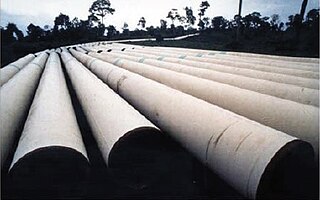Related Research Articles
Union Oil Company of California, and its holding company Unocal Corporation, together known as Unocal was a major petroleum explorer and marketer in the late 19th century, through the 20th century, and into the early 21st century. It was headquartered in El Segundo, California, United States.

The Alien Tort Statute, also called the Alien Tort Claims Act (ATCA), is a section in the United States Code that gives federal courts jurisdiction over lawsuits filed by foreign nationals for torts committed in violation of international law. It was first introduced by the Judiciary Act of 1789 and is one of the oldest federal laws still in effect in the U.S.

Human rights in Myanmar under its military regime have long been regarded as among the worst in the world. In 2022, Freedom House rated Myanmar’s human rights at 9 out 100.
Maung Maung is a Burmese trade unionist. During his studies, he earned a Bachelor of Science in geology.
There is a history of persecution of Muslims in Myanmar that continues to the present day. Myanmar is a Buddhist majority country, with significant Christian and Muslim minorities. While Muslims served in the government of Prime Minister U Nu (1948–63), the situation changed with the 1962 Burmese coup d'état. While a few continued to serve, most Christians and Muslims were excluded from positions in the government and army. In 1982, the government introduced regulations that denied citizenship to anyone who could not prove Burmese ancestry from before 1823. This disenfranchised many Muslims in Myanmar, even though they had lived in Myanmar for several generations.
Yu Xiaogang is a Chinese environmentalist. He was awarded the Goldman Environmental Prize in 2006 for his efforts in "creating groundbreaking watershed management programs while researching and documenting the socioeconomic impact dams had on local Chinese communities". He is among the six winners of the 2009 Ramon Magsaysay Awards, considered by many to be the Asian equivalent of the Nobel prize. He completed his Master's from the Asian Institute of Technology(AIT) in Thailand and his award citation says:
His interest in the environment was cultivated during a stint in the Yunnan Academy of Social Sciences, and was further deepened when he attended the Asian Institute of Technology, where he earned a master's degree in watershed management.

The Yadana gas field is an offshore gas field in the Andaman Sea. It is located about 60 kilometres (37 mi) offshore to the nearest landfall in Myanmar. The gas field is an important source of revenue for the Myanmar Army. Gas from Yadana is used to generate about 8 percent of the electricity in neighbouring Thailand and around half of all electricity in Myanmar’s largest city, Yangon.
Human rights violations in Aceh, Indonesia occurred in the late 1990s and early 2000s when ExxonMobil hired Indonesian military units to guard their Arun gas field, and these military units raided and razed local villages. Government inquiries have extensively documented these abuses. Victims allege that ExxonMobil knew about the atrocities, which include assault, torture, and murder, and should be liable for them. The company denies these accusations; its primary defense is that the human rights violations which were occurring were not a result of specific intention of the organization and therefore it cannot be held liable.

Aniceto Guterres Lopes is an East Timorese politician and human rights lawyer.
Katharine "Katie" Redford is an American human rights lawyer and activist who is credited with spearheading a movement to hold international companies accountable for overseas abuse in their home court jurisdictions, and in doing so, opened up new possibilities in human rights law. Along with her husband, human rights activist Ka Hsaw Wa from Burma/Myanmmar, she is the co-founder of EarthRights International, a non-profit group of activists, organizers, and lawyers with expertise in human rights, the environment, and corporate/government accountability. She left EarthRights in 2019 after 25 years to lead the newly founded Equation Campaign, a ten-year funding initiative working to bring about a safe future by enhancing the power of movements to keep oil and gas in the ground.
The Wiwa- family lawsuits against Royal Dutch Shell were three separate lawsuits brought in 1996 by the family of Ken Saro-Wiwa against Royal Dutch Shell, its subsidiary Shell Nigeria and the subsidiary's CEO Brian Anderson. Charges included human rights abuses against the Ogoni people in the Niger Delta, summary execution, torture, arbitrary arrest, and wrongful death. After 12 years of Shell petitioning the court not to hear the cases, they were heard 26 May 2009.
The Center for Justice and Accountability (CJA) is a US non-profit international human rights organization based in San Francisco, California. Founded in 1998, CJA represents survivors of torture and other grave human rights abuses in cases against individual rights violators before U.S. and Spanish courts. CJA has pioneered the use of civil litigation in the United States as a means of redress for survivors from around the world.

Doe v. Unocal, 395 F.3d 932, opinion vacated and rehearing en banc granted, 395 F.3d 978, was a lawsuit filed against Unocal for alleged human rights violations.

China National Offshore Oil Corporation, or CNOOC Group, is the third-largest national oil company in China, after CNPC and China Petrochemical Corporation. The CNOOC Group focuses on the exploitation, exploration and development of crude oil and natural gas in offshore China, along with its subsidiary COOEC.

Mona Seif is an Egyptian human rights activist known for her participation in dissident movements during and after the 2011 Egyptian revolution, for her creative use of social media in campaigns, and for her work to end military trials for civilian protesters. She is a biology graduate student, investigating the BRCA1 breast cancer gene.
Antonio Tony Oposa Jr. is a creative litigator, organizer and activist for environmental legislation in the Philippines. Oposa helped to litigate one of the first class-action suits taken by children to oppose environmentally-harmful actions taken by their government: in the 1990s, he represented 43 children from a local village to stop deforestation around the village that had been authorized by the Philippine government, on the basis that the children's rights would be harmed by the deforestation.

Venerable Pomnyun is a Seon master, author, and activist.

EarthRights International (ERI) is an American nonprofit human rights and environmental organization founded in 1995 by Katie Redford, Ka Hsaw Wa, and Tyler Giannini.
Chima Williams is an environmental activist, an environmental lawyer who fights environmental injustice and held a multinational company like Shell to pay for damages they have caused and inflicted on some communities in the Niger-Delta. He is also the founder of the first Student environmental justice group in Nigeria. He was named the Earth's foremost defenders.
Paul Sein Twa is a Karen environmentalist and indigenous activist from Myanmar who works to preserve the culture and environment of the Salween River basin. He co-founded the Karen Environmental and Social Action Network (KESAN) in 2001 to help Karen indigenous communities the preservation and protection of their land and heritage. He received the Goldman Environmental Prize in 2020 for his efforts.
References
- ↑ "Ka Hsaw Wa | EarthRights International". Earthrights.org. Retrieved 2012-01-28.
- ↑ "Local Activism". The Connection by NPR. Archived from the original on 2006-10-01. Retrieved 9 January 2021.
- ↑ "Unocal Settles Rights Suit in Myanmar". The New York Times. 2004-12-14.
- ↑ "Ka Hsaw Wa | Speak Truth to Power". www.speaktruthtopowerinschool.com. Retrieved 2019-06-17.
- ↑ "Total Denial (2006) - IMDb". Uk.imdb.com. Retrieved 2012-01-28.
- ↑ Goldman Environmental Prize. "Ka Hsaw Wa". Goldman Prize. Retrieved 2020-01-09.
- ↑ "Awardee". October 18, 2006. Archived from the original on 2006-10-18.
- ↑ "The Whitley Fund for Nature". Whitley-award.org. Archived from the original on 2012-02-11. Retrieved 2012-01-28.
- ↑ "2009 Ramon Magsaysay Awardee - KA HSAW WA". Rmaf.org.ph. 2009-08-31. Retrieved 2012-01-28.